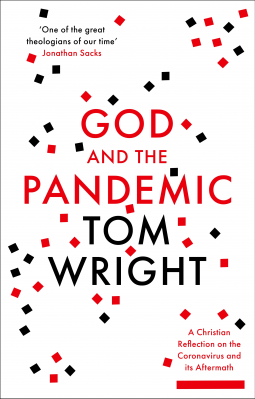
God and the Pandemic
A Christian Reflection on the Coronavirus and its Aftermath
by Tom Wright
This title was previously available on NetGalley and is now archived.
Send NetGalley books directly to your Kindle or Kindle app
1
To read on a Kindle or Kindle app, please add kindle@netgalley.com as an approved email address to receive files in your Amazon account. Click here for step-by-step instructions.
2
Also find your Kindle email address within your Amazon account, and enter it here.
Pub Date May 28 2020 | Archive Date May 27 2020
SPCK Publishing | 7.99
Talking about this book? Use #GodandthePandemic #NetGalley. More hashtag tips!
Description
Pandemic, Panic, Pangolin, Pandemonium...
What are we supposed to think about the coronavirus crisis?
Some people think they know: ‘This is a sign of the End,’ they say. ‘It’s all predicted in the book of Revelation.’
Others disagree but are equally clear: ‘This is a call to repent. God is judging the world and through this disease he’s telling us to change.’
Some join in the chorus of blame and condemnation: ‘It’s the fault of the Chinese, the government, the World Health Organization. . .’
Tom Wright examines these reactions to the virus and finds them wanting. Instead, he invites you to consider a different way of seeing and responding – a way that draws on the teachings and examples of scripture, and above all on the way of living, thinking and praying revealed to us by Jesus.
Available Editions
| EDITION | Paperback |
| ISBN | 9780281085118 |
| PRICE | £7.99 (GBP) |
Average rating from 10 members
Featured Reviews
 Natalie H, Reviewer
Natalie H, Reviewer
I received an advance reader copy of this book to read in exchange for an honest review via netgalley and the publishers.
This is an insightful book focusing on the current worldwide pandemic we are facing and relates it to God and Jesus and what Jesus taught us and wants us to see and understand about ourselves and our world.
This book has been well researched and a lot of work has obviously been done by the author to put it all together.
 Reviewer 451445
Reviewer 451445
This short book (88 pages) is Tom Wright's attempt to answer the question of where is God in the coronavirus Pandemic? It packs alot into a small package and covers much ground. In a nutshell the answer given by Wright is that the question we should ask isn't "Why is God allowing this pandemic?" but rather "How can we respond as Christians to this pandemic?"
His answer is summed up here in his own words: "...when the world is going through great convulsions, the followers of Jesus are called to be people of prayer at the place where the world stands is in pain."
"We expect God to be, as we might say, 'in charge': taking control, sorting things out, getting things done. But the God we see in Jesus is the God who wept at the tomb of his friend. The God we see in Jesus is the God-the-Spirit who groans without words. The God we seen in Jesus is the one who, to demonstrate what his kind of 'being in charge' would look like, did the job of a slave and washed hi disciples feet." In other words...Christians should respond by weeping with the mourners and serving and helping those in need. This is how God is seen to those who ask where he is.
Later however Wright treads on ground where he himself seems unsure and to my mind paints an unnecessarily impotent view of God:
"...God himself, God the Spirit, apparently unable to manage words, but only groans!"
"Here is the mystery. God the Father knows the Spirit's mind; but the mind that the Father thereby knows is the mind that doesn't know what to say."
Wright does acknowledge the mystery present here: "Dare we say then that God the creator, facing his world in melt-down, is himself in tears, even though he remains the God of ultimate Providence?"
Perhaps because of this question of the Spirit's seeming inability to find actual words, Wright proposes: "Providence is Jesus-shaped: it isn't an iron grip, relentlessly 'controlling' everything."
Wright seems to go further than the text regarding God when he says: "Many things, after all, actually bring grief to God. They shock him." He doesn't adequately explain what he means by "shock".
"...some things apparently shock God....God's response is to say, I didn't command this, nor did it come into my mind (Jeremiah 7.31; repeated in 32.5). Actually, the Hebrew text again says 'heart' both times. God neither intended it nor even dreamed of it."
Later Wright circles back and repeats this 'shock of God' claim: "...God has in fact delegated the running of many aspects of his world to human beings. In doing so, he has run the risk that they will grieve him to his heart or shock him out of his mind. But when this happens, he will hold people responsible." The picture of God being shocked "out of his mind" is not one that matches the Biblical view of his omniscient knowledge and wisdom and God's own stability.
Most of this book is helpful and there is more than enough to aid Christians in answering questions of what God is doing and where God can be seen. Yet, perhaps because of the demands of getting a book on the pandemic out so quickly, some thoughts which would be better given more space to be fleshed out and revised are left hanging rather ominously. I get the impression (rightly or wrongly) that Wright is at times thinking out loud but doesn't have the time or space to revise or at least further pursue his thoughts so reaches sometimes speculative conclusions which, in my view, would benefit from greater clarify. In a longer book he might have provided that clarity.
Wright then concedes the paradoxical nature of God's providential guidance of events citing Peter's sermon in Acts 2.23, that Jesus' death was "...what God had intended and planned - but that the people who arrested, tried and killed him were wicked to do so. There is no way round this paradox, nor should we look for one. We are not given a nice, comprehensible, mechanistic analysis."
Wright rightly points out that Christians have a long historical track record of helping and ministering to others in times of crisis in a whole variety of ways.
"Part of the answer to the question, 'Where is God in the pandemic?' must be, 'Out there on the front line, suffering and dying to bring healing and hope.'
He also expresses sympathy with both sides in the debate over whether churches should be open or closed in the pandemic although at times he politicises his theology and I'm not sure if that's wise here.
He expresses concern at the way much of the Church seems to have followed the lead of the secular world rather than leading the way. In fact his rallying cry near the end of the book is, ' Someone needs to stand up and read - perhaps not the riot act, but Psalm 72. This is the list of priorities that the Church should be articulating, not just in speech but in political proposals to go at the top of the agenda..."
"What we need right now is someone to do in this challenging moment what Joseph did at Pharaoh's court, analysing the situation and sketching a vision for how to address it. We urgently need statesmanlike, wise leadership, with prayerful Christian leaders taking a place alongside others, to think with both vision and realism through challenges that we shall face in the coming months."
Even in such a short book it feels like it's taken a long pathway to get to this final near prophetic call for the Church to lead. The book is generally a good attempt to 'find God in the pandemic'. I'm not sure Wright's initial dismissal of the question of why God would allow the pandemic (that's for God to know and not us), in favour of proposing how the Church should respond, is entirely helpful. While Wright expresses the historical role of the Church in serving others in time of crisis., it feels like he is sidestepping the question of why God would allow the pandemic in the first place. A bit like a politician answering the question he wanted to be asked.
All in all well worth a read with some insightful exposition but with the caveats indicated above.
Thanks to NetGalley and SPCK for ARC.
 Hugh D, Librarian
Hugh D, Librarian
Amongst the hyperbole and hysterics of ‘commentators’ at the moment it can be difficult to discern a voice of reason. Tom Wright is always measured in his tone and considered in his statements and this book is no exception. This short book is exactly what every Christian needs to hear right now: it is certainly not simply a book of ‘it’ll be alright in the end’ platitudes. This is a real book tackling an urgent, difficult and frequently frightening subject with consideration and biblical basis.
To quote Professor Wright, this is “not a matter of simple answers or solutions, there is not a trite statement of it will all be alright in the end but that ‘God-lovers’ are shaped according to the pattern of the Son: in the cruciform pattern in which God’s justice and mercy, his faithfulness to the covenant and to creation, are displayed before the world in tears and toil, lament and labour.”
Having said that, Professor Wright does provide us with encouragement and shares the hope found in scripture, allowing us to consider our position in this crisis and suggesting how we might best mentally and spiritually deal with this.
Finally, this book is written to provide help and encouragement in a time of trouble and anxiety and is indeed very timely. It is certainly not a cash-in title – there will be enough of those – indeed all proceeds from this book will go to Covid-19 charities.
 Rachael N, Reviewer
Rachael N, Reviewer
The best response to the covid-19 crisis I have read; wise and theologically grounded, written with Tom Wright's unmistakeable style.
This was a really insightful read bringing up opinions from all walks of life, not just Christianity. It used passages and verses to demonstrate different perceptions and understandings of not just Coronavirus but many other 'World Disasters' that have happened in the past.
It really made me think that instead of looking for and dwelling on the reasons WHY something has happened that instead we should look at HOW we can move forward. What we can do as a community to help others. In this strange time of life it's forced us all to slow down and evaluate our lives and I think this draws on that. Relating to the words of the scripture to increase this.
You are not forced to any conclusion or a specific way of thinking which I really like as the book lets you make your own conclusion from a number of different gospels.
It's good to see a well-thought out Christian response to the current COVID-19 pandemic. Tom Wright encourages the reader to avoid trite sound-bites and instead to take a careful look at God's purposes throughout history. By looking at what we should be doing, rather than why this is happening, we are more fully able to serve God in the midst of this crisis. Wright offers helpful suggestions as to how Christians should respond, whilst acknowledging that some particular issues have no straightforward resolution. I found this book to be a helpful reframing of my questions around the pandemic.
Readers who liked this book also liked:
Jakub Politzer (Illustrator), Christina Dumalasova (adapter), Katerina Horakova (adapter)
Comics, Graphic Novels, Manga, General Fiction (Adult)


















